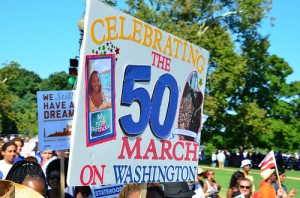Missing the history from the historic march on Washington commemoration
04 September 2013 – Jason Steinhauer
Several months ago in this space I reflected on the large crowds that flocked to Washington to witness President Obama’s historic second inaugural. Again, this past Wednesday, crowds assembled in Washington to hear the President offer “historic” remarks, this time on the steps of the Lincoln Memorial in commemoration of the March on Washington in August 1963.
The President was one of dozens of speakers for this important and necessary event. Yet Wednesday’s commemoration of the March on Washington left me with a profound ambivalence by the end of the day.
On the positive, that there was such a pronounced commemoration felt like a triumph for public historians. We’ve so successfully argued for history in the public consciousness that scarcely a historic event goes by without a high-profile public remembrance. Such remembrances now feel obligatory due to the work of museums, archives, documentary films, and national parks bringing history to the forefront of people’s minds. That should make us proud.
The ceremony at the Lincoln Memorial, however—which I streamed from my desk inside the Library of Congress—left me somewhat empty. It seemed to try very hard to be “historic,” so much so that history itself got lost. Most striking: the absence of any historians, public or academic, from the day’s list of speakers.
The addition of historians would have been immensely valuable. Actors, musicians, union leaders, and politicians certainly attest to the progress of Dr. King’s dream in individual terms. But to have celebrities and media personalities attempt to contextualize a seismic moment in American history without scholarly or historical perspective did little to enrich our understanding of that moment. A transformative event in our society deserved measured and considered public reflection on the national stage.
There were certainly ample candidates to offer remarks. Lonnie Bunch, director of the Smithsonian’s National Museum of African American History and Culture would have been an obvious choice. Dr. James Billington, Librarian of Congress, or John Gray, director of the National Museum of American History, would have been wonderful additions. Pulitzer Prize winner Nick Kotz could have been invited. Even Robert Caro or Doris Kearns Goodwin would have been welcome.
Many who did speak offered examples of how success is achievable for minority Americans in a way we deserved to see. But on a day when we turned our attention to history, we also deserved the analysis, contextualization, honest debate, humility, and the willingness to dig through evidence without prior commitment to an outcome that historians bring. An opportunity was missed to share that considered perspective with a nation primed for reflection, thought, and understanding of how our past is interwoven with our present and our future.
The absence of this measured, thoughtful consideration of King’s and the March’s legacy from the public commemoration led me to ask unsettling questions. I began to worry that we had become so successful in making history matter that it may now be ripe for appropriation by politicians, pundits, and the entertainment industry. Wish to make yourself relevant? Do something “historic.” Wish to be taken seriously? Make “history” your second career. The consequences of this are that we receive a hodge-podge of mixed metaphors and media-ready sound bites where we need serious scholarship and thoughtful analysis. Is this where public history is heading?
This is surely hyperbole. Yet still by nightfall I was left with the worry that we had so successfully made history important to the public that historical commemoration risked becoming more a contrived attempt to “make history” than a sincere and measured reflection on an important event of our past. It compels me to urge us all as historians to continue to fight for our rightful seat at the table as national and local commemorations are planned. We have important roles to play in these events: among them is to ensure that in re-telling the stories of our past, the storytellers do not become more important than the story.
~ Jason Steinhauer is Program Specialist for The John W. Kluge Center at the Library of Congress and an award-winning public historian, and an accomplished curator, oral historian, archivist, and musician, and passionate advocate for history.





Thanks for this thought-provoking post, Jason. One thing I wondered about was your connecting the dots between the spread of a public historical consciousness and the proliferation of these kinds of high-profile (and seemingly automatic) anniversary commemorations. As with your piece on the inauguration, it actually struck me that all the hype about “historic moments” may reflect a dearth of historical consciousness, rather than an awareness of it. That is, “historic” has just become a kind of premium brand for any event or cause, rather than a way of seriously thinking about what happened in the past or what’s happening in the present and how they’re connected to each other. So I’m not convinced that we’ve “successfully made history important to the public” – it seems more to me as though much of the public has just decided that anything that feels important must be “historic,” without (as you point out) really having any sense of what it might mean to make that judgment or apply that label in a more thoughtful, nuanced way.
Agreed, it may be a leap to draw that direct cause and effect. Something in my instinct tells me the proliferation and professionalization of “History” has had an effect on raising its visibility, which then has contributed to its appropriation. It’s an interest topic to explore further–and perhaps someone already has. Your other points are spot on. I do feel public history has made history visible and raised its national significance, even from when I was growing up. Public history institutions have made great strides bringing history out of the ivory tower and to the public in participatory, engaging, and meaningful ways–and I’m not above claiming some credit for us where it may be deserved!